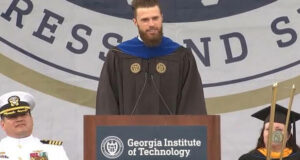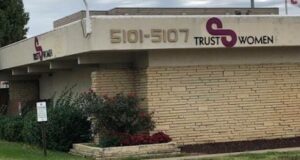Kansas Gov.-elect Laura Kelly insists the state budget she’s preparing can fully fund the state’s schools, expand Medicaid coverage to another 150,000 people and begin to repair a troubled child welfare system — without a tax hike.
The Democrat said Wednesday night she’ll lean on experience and relationships built over 14 years in the Kansas Senate to carve out compromises with lawmakers on those priorities.
Yet she described her job as daunting and state government as broken in several key areas.
In little over a month since she beat Republican Kris Kobach in the race for governor, Kelly said she’s worked on a budget proposal to put to legislators in January and found serious problems in state government.
“No surprises … but I am disappointed that the devastation was even worse than I thought,” she told a crowd of 200-plus at Washburn University in Topeka. “The problems are broad and they’re deep.”
Kelly said rosy revenue projections — the state’s draw from taxes and fees has beat expectations for 18 months in a row — suggest the ability to deal with “school finances without breaking the bank.”
She’s braced for a push from conservatives in the Capitol to pass an amendment to the state constitution scrubbing out the demand for “suitable” financing to local districts from the state. Much of the Republican leadership in the state contends that would free lawmakers to decide funding levels without ongoing lawsuits dictating what the state should spend.
She promised to oppose such a move.
The state may yet need to add money for aid to local school districts in the wake of a Kansas Supreme Court decision. A plan to add hundreds of millions to that formula in coming years was approved by the Legislature and Republican Gov. Jeff Colyer earlier this year.
But more money may still be needed to account for inflation. Kelly said she’s been studying the state budget and recent improvements in tax revenues.
“We will find when the budget comes out we can afford” to cover her top priorities, she said, without raising taxes.
Republicans have already begun to challenge her definition of a tax hike. Federal tax cuts pushed through by the Trump administration last year had the unintended effect of increasing what a small minority of taxpayers owe the state. Some people simply can’t itemize things like they did before.
That’s produced a windfall in state revenues. Broadly speaking, Republican lawmakers say failing to rewrite state tax law to return that money amounts to a tax hike.
Kelly sees it differently.
She argued again Wednesday that Kansas policymakers don’t yet fully understand the impact of the partial reversal in 2017 of sweeping tax cuts enacted under former Gov. Sam Brownback five years earlier. She also said state officials still need to better fathom how the Trump tax cuts will change state finances.
Only well into 2019, she said, will those things become clear.
“It’s at that point we can look” at whether to return the windfall, she said.
Yet she talked confidently about corralling votes in the Legislature for an expansion of Medicaid in line with the federal Affordable Care Act, or Obamacare.
She was vague about how much her plan for that expansion would cost Kansas taxpayers — and suggested it might not cost them anything. But Kelly promised to study other states in search of a model that can work in Kansas.
A fight will come in the Legislature, where conservatives are already girding for battle. In the end, she said Democrats and moderate Republicans — what she calls “the moderate majority” — can push through a plan.
This year’s elections replaced some moderates with either conservatives or Democrats. But Kelly said the math is roughly the same as when lawmakers approved expansion in 2016 and came just three votes shy of overcoming a Brownback veto.
The difference this year: “We don’t have to override vetoes.”
Among other things she said in a rare public appearance since her election:
- She’s exploring whether the state must enforce a law passed this year allowing some state-hired faith-based adoption agencies to deny placements with same-sex parents.
- Kelly will collect proposals on what she called “common sense” gun control, but seemed to suggest any proposal won’t come soon. “I’m not sure how quickly we can get that policy together and round up the votes.”
- Her efforts on climate change will focus on working with the state’s congressional delegation and western governors. She also promised to push for more renewable energy use in the state.
- Kelly said tighter welfare rules are part of the reason more kids are landing in foster care. Changing those rules, she said, is “a priority” for fixing DCF.
- She gave Brownback credit for his efforts to deal with the state’s dwindling water supply. “The problem is,” she said, “there was absolutely no funding, very little funding, put into it.”
- Kelly said the state’s criminal sentencing practices need dramatic reform and locks up non-violent offenders too often and for too long. “Those people belong in prison no more than you or I.”
 Metro Voice News Celebrating Faith, Family & Community
Metro Voice News Celebrating Faith, Family & Community









